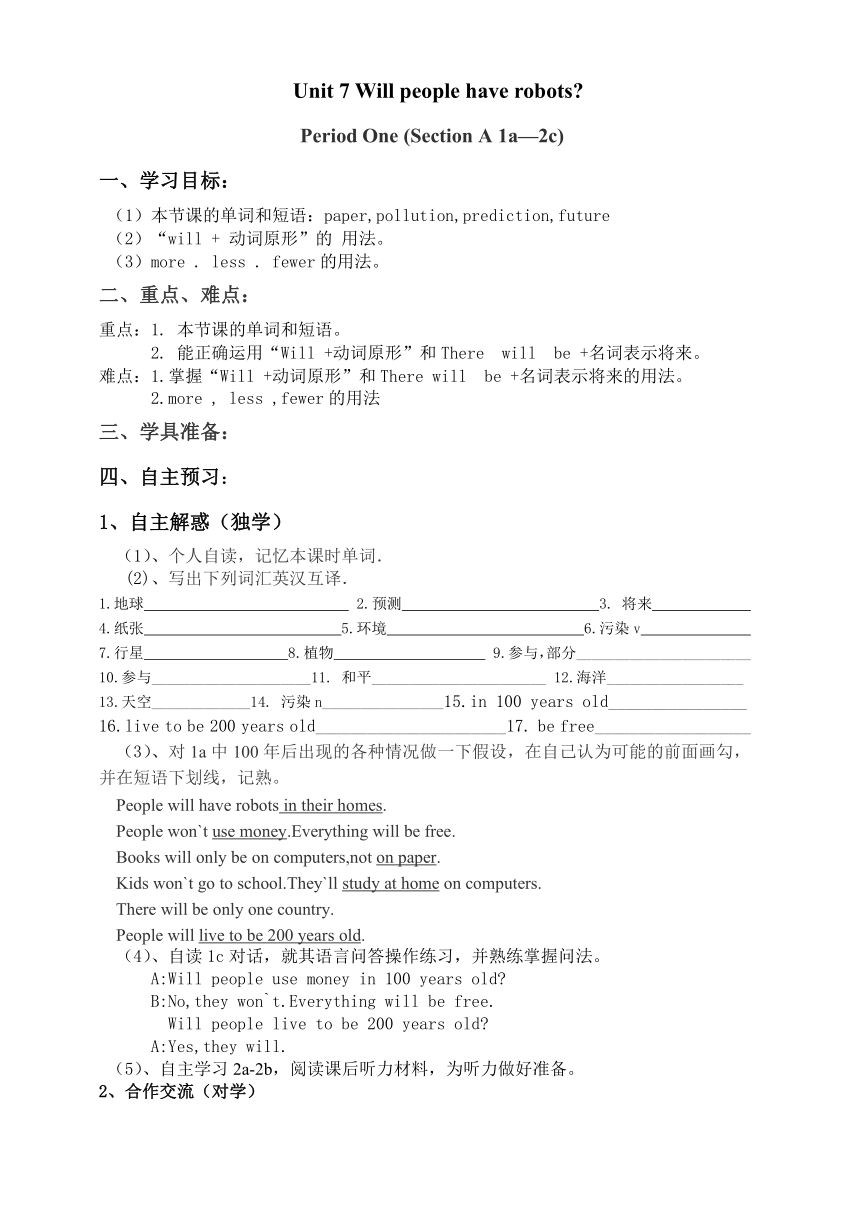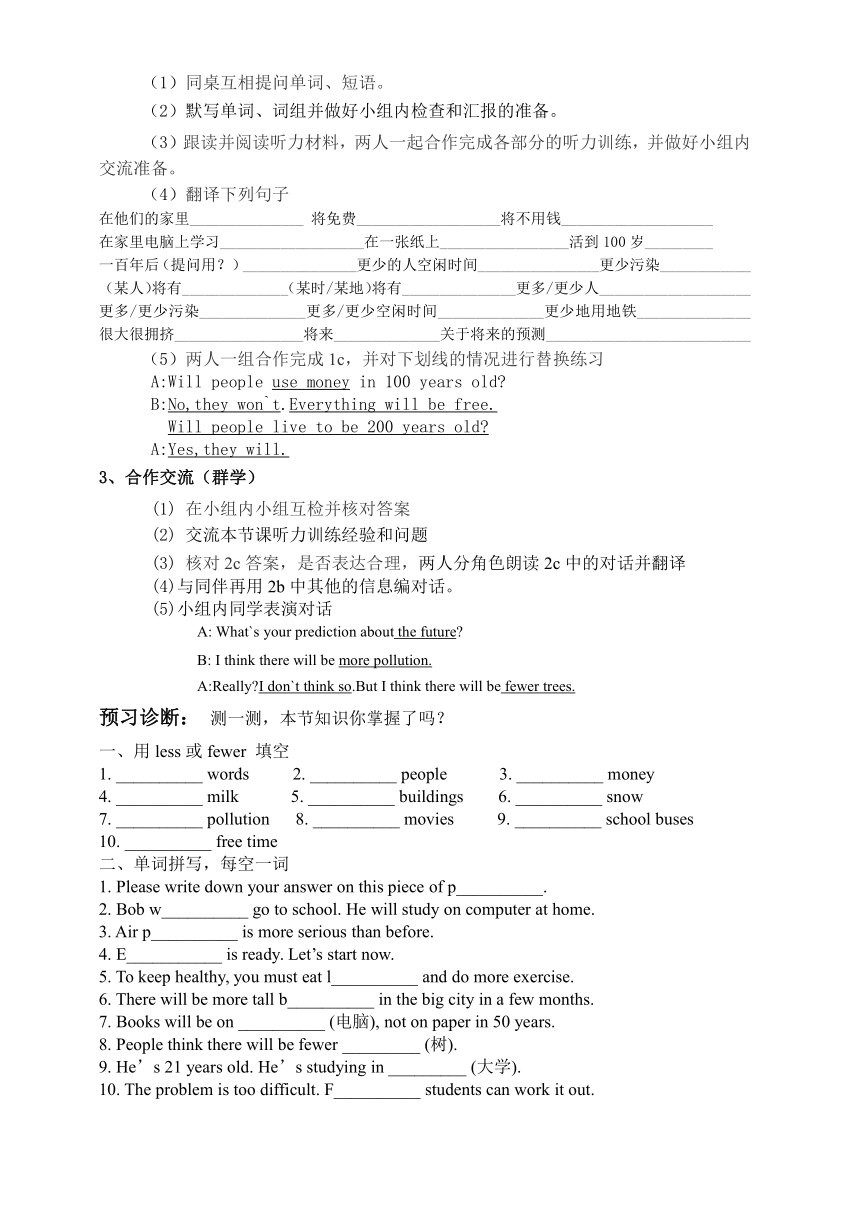Unit 7 Will people have robots Section A 1a—2c 学案
文档属性
| 名称 | Unit 7 Will people have robots Section A 1a—2c 学案 |  | |
| 格式 | zip | ||
| 文件大小 | 56.6KB | ||
| 资源类型 | 教案 | ||
| 版本资源 | 人教新目标(Go for it)版 | ||
| 科目 | 英语 | ||
| 更新时间 | 2023-01-05 18:03:33 | ||
图片预览


文档简介
Unit 7 Will people have robots
Period One (Section A 1a—2c)
一、学习目标:
(1)本节课的单词和短语:paper,pollution,prediction,future
(2)“will + 动词原形”的 用法。
(3)more . less . fewer的用法。
二、重点、难点:
重点:1. 本节课的单词和短语。
2. 能正确运用“Will +动词原形”和There will be +名词表示将来。
难点:1.掌握“Will +动词原形”和There will be +名词表示将来的用法。
2.more , less ,fewer的用法
三、学具准备:
四、自主预习:
1、自主解惑(独学)
(1)、个人自读,记忆本课时单词.
(2)、写出下列词汇英汉互译.
1.地球 2.预测 3. 将来
4.纸张 5.环境 6.污染v
7.行星 8.植物 9.参与,部分_______________________
10.参与_____________________11. 和平_______________________ 12.海洋__________________
13.天空_____________14. 污染n________________15.in 100 years old________________
16.live to be 200 years old______________________17. be free__________________
(3)、对1a中100年后出现的各种情况做一下假设,在自己认为可能的前面画勾,并在短语下划线,记熟。
People will have robots in their homes.
People won`t use money.Everything will be free.
Books will only be on computers,not on paper.
Kids won`t go to school.They`ll study at home on computers.
There will be only one country.
People will live to be 200 years old.
(4)、自读1c对话,就其语言问答操作练习,并熟练掌握问法。
A:Will people use money in 100 years old
B:No,they won`t.Everything will be free.
Will people live to be 200 years old
A:Yes,they will.
(5)、自主学习2a-2b,阅读课后听力材料,为听力做好准备。
2、合作交流(对学)
(1)同桌互相提问单词、短语。
(2)默写单词、词组并做好小组内检查和汇报的准备。
(3)跟读并阅读听力材料,两人一起合作完成各部分的听力训练,并做好小组内交流准备。
(4)翻译下列句子
在他们的家里_______________ 将免费___________________将不用钱____________________
在家里电脑上学习___________________在一张纸上_________________活到100岁_________
一百年后(提问用?)_______________更少的人空闲时间________________更少污染____________(某人)将有______________(某时/某地)将有_______________更多/更少人____________________更多/更少污染______________更多/更少空闲时间______________更少地用地铁_______________很大很拥挤_________________将来______________关于将来的预测___________________________
(5)两人一组合作完成1c,并对下划线的情况进行替换练习
A:Will people use money in 100 years old
B:No,they won`t.Everything will be free.
Will people live to be 200 years old
A:Yes,they will.
3、合作交流(群学)
(1) 在小组内小组互检并核对答案
(2) 交流本节课听力训练经验和问题
(3) 核对2c答案,是否表达合理,两人分角色朗读2c中的对话并翻译
(4)与同伴再用2b中其他的信息编对话。
(5)小组内同学表演对话
A: What`s your prediction about the future
B: I think there will be more pollution.
A:Really I don`t think so.But I think there will be fewer trees.
预习诊断: 测一测,本节知识你掌握了吗?
一、用less或fewer 填空
1. __________ words 2. __________ people 3. __________ money
4. __________ milk 5. __________ buildings 6. __________ snow
7. __________ pollution 8. __________ movies 9. __________ school buses
10. __________ free time
二、单词拼写,每空一词
1. Please write down your answer on this piece of p__________.
2. Bob w__________ go to school. He will study on computer at home.
3. Air p__________ is more serious than before.
4. E___________ is ready. Let’s start now.
5. To keep healthy, you must eat l__________ and do more exercise.
6. There will be more tall b__________ in the big city in a few months.
7. Books will be on __________ (电脑), not on paper in 50 years.
8. People think there will be fewer _________ (树).
9. He’s 21 years old. He’s studying in _________ (大学).
10. The problem is too difficult. F__________ students can work it out.
11. Young people like to write e-mails o__________ computers.
12. People will have much free time because _________ (机器人) will help us do most work.
13. There are ____________(更少的) boy students than girl students in our school.
五、情境导入:
六、预习反馈展示交流
请各小组踊跃展示你的预习成果!
(一)、本节单词预习展示
(小组内听写训练)
(二)、本节重点词组展示
(小组轮流黑板上听写训练)
(三)、本节主要功能句型展示
(讲台上合作试演对话)
1c对话操练:
A:Will people use money in 100 years old
B:No,they won`t.Everything will be free.
Will people live to be 200 years old
A:Yes,they will.
2c对话表演:
A: What`s your prediction about the future
B: I think there will be more pollution.
A:Really I don`t think so. But I think there will be
fewer trees.
七、疑难互动
请同学们进一步讨论如下问题:
1、 重点单词、词语汇总讲解
写出比较级、最高级形式:
many______ ___________ 后加_______ 名词
much ______ __________ 后加_______ 名词
few _______ __________ 后加_______ 名词
little _______ ________后加_______ 名词
Be free___________,live to be___________
100年后___________,将要有/将举行_____________更多的污染 ________ pollution,
更少的苹果__________apple更少的人_____________people ,更少的钱 ________money
2、解决同学们课下自主预习中学习方法和细节操作问题。
3、本课语法知识普及。
一般将来时态:(参考课本P116)
①用法:表示将来_________________________________________。
②构成:肯定:will do/be 否定:won’t do/be
在疑问句中,当主语为第一人称(I和we)时,常用助动词______________代替will。
Shall we get something to eat 我们弄点吃的东西怎么样
What shall I do 我该怎么办呢
③常用时间状语:tomorrow, tomorrow morning, next week, in the future, the day after tomorrow, in 100 years
④句式变换:用______
People will have robots in their homes.
(1)变为一般疑问句及肯定否定答语:
(2)变否定句 __
(3)对划线部分提问
⑤某时,某地“将有”用______________________或_______________________________
明天将有一场大雨。 _____________________ a heavy rain tomorrow.
今晚将有两场足球赛。 _____________________ two soccer games tonight.
There will be less free time.
(1)变为一般疑问句及肯定否定答语:
(2)变否定句 __
(3)对划线部分提问
八、巩固训练 拓展延伸
(一)、用所给单词的适当形式填空
1. My mother _________ (be) back in two days.
2. There _________ (be) heavy snow tomorrow.
3. He _________ (take) the train to school yesterday.
4. The builders built many ___________ (build) in our city last year.
5. We can do the work with _______(little) money and ________(few) people than they can.
6. They _______________ ( not have ) any classes next week.
7. Betty ______________ (write) to her parents tomorrow.
8. Look at those clouds. It ______________ (rain).
9. He ____________ ( read ) an English book now.
10. Look! Many girls _______________ (dance) over there.
11. There_________ (be) a football match tomorrow afternoon.
12. _________ they _________ (go) hiking next Sunday
(二)、用“有”的适当时态填空:
1. I ______ a new car, but he _____ an old car.
2. ___________ a class meeting next Monday.
3. _____________ great changes(变化) in 100 years.
4. They ____ much money ten years ago.
5. ____________ any good news in yesterday's newspaper
_____________robots in people's homes in100 years
九、系统总结 点拨建构 你来总结今天的收获吧!
十、课后反思
1、对教学内容:
2、对教学过程
3、对教学效果
4、意见及建议
教师活动:
教师活动:
Period One (Section A 1a—2c)
一、学习目标:
(1)本节课的单词和短语:paper,pollution,prediction,future
(2)“will + 动词原形”的 用法。
(3)more . less . fewer的用法。
二、重点、难点:
重点:1. 本节课的单词和短语。
2. 能正确运用“Will +动词原形”和There will be +名词表示将来。
难点:1.掌握“Will +动词原形”和There will be +名词表示将来的用法。
2.more , less ,fewer的用法
三、学具准备:
四、自主预习:
1、自主解惑(独学)
(1)、个人自读,记忆本课时单词.
(2)、写出下列词汇英汉互译.
1.地球 2.预测 3. 将来
4.纸张 5.环境 6.污染v
7.行星 8.植物 9.参与,部分_______________________
10.参与_____________________11. 和平_______________________ 12.海洋__________________
13.天空_____________14. 污染n________________15.in 100 years old________________
16.live to be 200 years old______________________17. be free__________________
(3)、对1a中100年后出现的各种情况做一下假设,在自己认为可能的前面画勾,并在短语下划线,记熟。
People will have robots in their homes.
People won`t use money.Everything will be free.
Books will only be on computers,not on paper.
Kids won`t go to school.They`ll study at home on computers.
There will be only one country.
People will live to be 200 years old.
(4)、自读1c对话,就其语言问答操作练习,并熟练掌握问法。
A:Will people use money in 100 years old
B:No,they won`t.Everything will be free.
Will people live to be 200 years old
A:Yes,they will.
(5)、自主学习2a-2b,阅读课后听力材料,为听力做好准备。
2、合作交流(对学)
(1)同桌互相提问单词、短语。
(2)默写单词、词组并做好小组内检查和汇报的准备。
(3)跟读并阅读听力材料,两人一起合作完成各部分的听力训练,并做好小组内交流准备。
(4)翻译下列句子
在他们的家里_______________ 将免费___________________将不用钱____________________
在家里电脑上学习___________________在一张纸上_________________活到100岁_________
一百年后(提问用?)_______________更少的人空闲时间________________更少污染____________(某人)将有______________(某时/某地)将有_______________更多/更少人____________________更多/更少污染______________更多/更少空闲时间______________更少地用地铁_______________很大很拥挤_________________将来______________关于将来的预测___________________________
(5)两人一组合作完成1c,并对下划线的情况进行替换练习
A:Will people use money in 100 years old
B:No,they won`t.Everything will be free.
Will people live to be 200 years old
A:Yes,they will.
3、合作交流(群学)
(1) 在小组内小组互检并核对答案
(2) 交流本节课听力训练经验和问题
(3) 核对2c答案,是否表达合理,两人分角色朗读2c中的对话并翻译
(4)与同伴再用2b中其他的信息编对话。
(5)小组内同学表演对话
A: What`s your prediction about the future
B: I think there will be more pollution.
A:Really I don`t think so.But I think there will be fewer trees.
预习诊断: 测一测,本节知识你掌握了吗?
一、用less或fewer 填空
1. __________ words 2. __________ people 3. __________ money
4. __________ milk 5. __________ buildings 6. __________ snow
7. __________ pollution 8. __________ movies 9. __________ school buses
10. __________ free time
二、单词拼写,每空一词
1. Please write down your answer on this piece of p__________.
2. Bob w__________ go to school. He will study on computer at home.
3. Air p__________ is more serious than before.
4. E___________ is ready. Let’s start now.
5. To keep healthy, you must eat l__________ and do more exercise.
6. There will be more tall b__________ in the big city in a few months.
7. Books will be on __________ (电脑), not on paper in 50 years.
8. People think there will be fewer _________ (树).
9. He’s 21 years old. He’s studying in _________ (大学).
10. The problem is too difficult. F__________ students can work it out.
11. Young people like to write e-mails o__________ computers.
12. People will have much free time because _________ (机器人) will help us do most work.
13. There are ____________(更少的) boy students than girl students in our school.
五、情境导入:
六、预习反馈展示交流
请各小组踊跃展示你的预习成果!
(一)、本节单词预习展示
(小组内听写训练)
(二)、本节重点词组展示
(小组轮流黑板上听写训练)
(三)、本节主要功能句型展示
(讲台上合作试演对话)
1c对话操练:
A:Will people use money in 100 years old
B:No,they won`t.Everything will be free.
Will people live to be 200 years old
A:Yes,they will.
2c对话表演:
A: What`s your prediction about the future
B: I think there will be more pollution.
A:Really I don`t think so. But I think there will be
fewer trees.
七、疑难互动
请同学们进一步讨论如下问题:
1、 重点单词、词语汇总讲解
写出比较级、最高级形式:
many______ ___________ 后加_______ 名词
much ______ __________ 后加_______ 名词
few _______ __________ 后加_______ 名词
little _______ ________后加_______ 名词
Be free___________,live to be___________
100年后___________,将要有/将举行_____________更多的污染 ________ pollution,
更少的苹果__________apple更少的人_____________people ,更少的钱 ________money
2、解决同学们课下自主预习中学习方法和细节操作问题。
3、本课语法知识普及。
一般将来时态:(参考课本P116)
①用法:表示将来_________________________________________。
②构成:肯定:will do/be 否定:won’t do/be
在疑问句中,当主语为第一人称(I和we)时,常用助动词______________代替will。
Shall we get something to eat 我们弄点吃的东西怎么样
What shall I do 我该怎么办呢
③常用时间状语:tomorrow, tomorrow morning, next week, in the future, the day after tomorrow, in 100 years
④句式变换:用______
People will have robots in their homes.
(1)变为一般疑问句及肯定否定答语:
(2)变否定句 __
(3)对划线部分提问
⑤某时,某地“将有”用______________________或_______________________________
明天将有一场大雨。 _____________________ a heavy rain tomorrow.
今晚将有两场足球赛。 _____________________ two soccer games tonight.
There will be less free time.
(1)变为一般疑问句及肯定否定答语:
(2)变否定句 __
(3)对划线部分提问
八、巩固训练 拓展延伸
(一)、用所给单词的适当形式填空
1. My mother _________ (be) back in two days.
2. There _________ (be) heavy snow tomorrow.
3. He _________ (take) the train to school yesterday.
4. The builders built many ___________ (build) in our city last year.
5. We can do the work with _______(little) money and ________(few) people than they can.
6. They _______________ ( not have ) any classes next week.
7. Betty ______________ (write) to her parents tomorrow.
8. Look at those clouds. It ______________ (rain).
9. He ____________ ( read ) an English book now.
10. Look! Many girls _______________ (dance) over there.
11. There_________ (be) a football match tomorrow afternoon.
12. _________ they _________ (go) hiking next Sunday
(二)、用“有”的适当时态填空:
1. I ______ a new car, but he _____ an old car.
2. ___________ a class meeting next Monday.
3. _____________ great changes(变化) in 100 years.
4. They ____ much money ten years ago.
5. ____________ any good news in yesterday's newspaper
_____________robots in people's homes in100 years
九、系统总结 点拨建构 你来总结今天的收获吧!
十、课后反思
1、对教学内容:
2、对教学过程
3、对教学效果
4、意见及建议
教师活动:
教师活动:
同课章节目录
- Unit 1 Where did you go on vacation?
- Section A
- Section B
- Unit 2 How often do you exercise?
- Section A
- Section B
- Unit 3 I'm more outgoing than my sister.
- Section A
- Section B
- Unit 4 What's the best movie theater?
- Section A
- Section B
- Unit 5 Do you want to watch a game show?
- Section A
- Section B
- Unit 6 I'm going to study computer science.
- Section A
- Section B
- Unit 7 Will people have robots?
- Section A
- Section B
- Unit 8 How do you make a banana milk shake?
- Section A
- Section B
- Unit 9 Can you come to my party?
- Section A
- Section B
- Unit 10 If you go to the party, you'll have a grea
- Section A
- Section B
